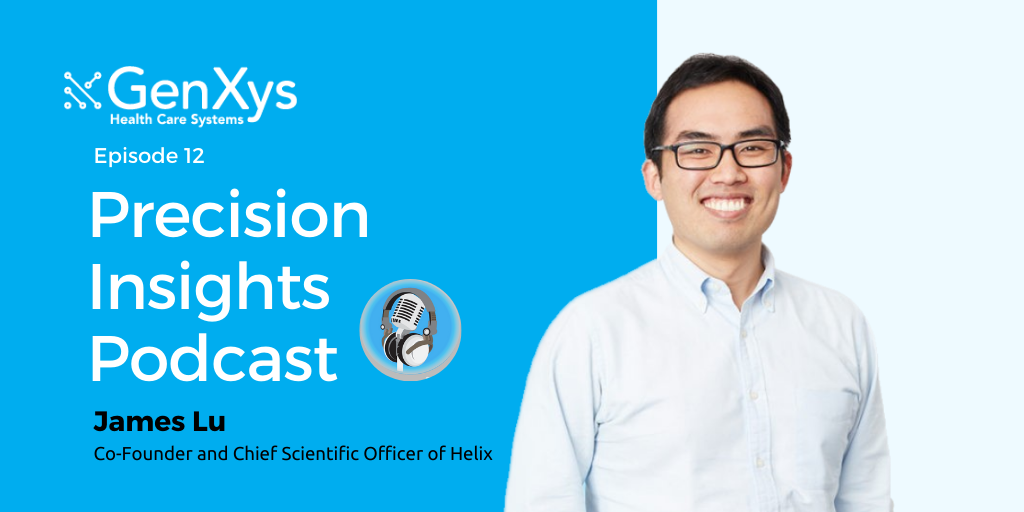
Dr. James Lu co-founded population genomics company Helix in 2015, where he leads the research, regulatory policy and bioinformatics teams. He oversees the teams that develop and validate the science and technology behind Helix’s solution, including Helix’s next generation sequencing lab. Dr. Lu also works with Helix’s partners to design and execute population-scale genomic research initiatives.
In one of our Precision Insights Podcast episodes, he shared some of his experiences with genetic testing and his thoughts on the future of precision medicine. This is an insightful summary of the discussion.
In particular, we explored one big question: Why is the combination of genetics and digital technology so powerful? Listen to the full episode here:
“That [DNA] variation is what makes you different, me and you different and different from everyone else in the world. That’s part of the splendor of humankind.”
PGx then, now, and in the future
Over the course of a decade, genetic testing has gone from mapping the variation in just hundreds of people to testing of hundreds of thousands of people in health system settings alone. While pharmacogenetics (PGx) is still in the early parts of the adoption curve, there’s great evidence in cardiology, mental health, pain, and in some parts of oncology. On a population-level basis, Helix has been generating some of that core evidence with their health care systems. It is expected that in the next five years there will be a vast migration of healthcare systems believing that precision medicine at this scale will become part of the standard of care.
Going forward, there is an expectation that certain populations are going to end up having several pharmacogenetic questions over their lifetime. It’s going to be worth it to generate that data upfront and make sure that it’s easy to incorporate, because having data at the tips of the provider’s hands will be incredibly powerful.
How do you equip your health care providers to act appropriately and have the right knowledge? The key is digital tools. There needs to be some sort of digital guardrails that can help determine what is within the practice boundaries and what needs specialist referral. The requirements for medical knowledge are only increasing, so it’s impossible to keep up with absolutely everything. You really need these digital tools to really perform at the cutting edge of precision medicine.
(Related Post: The Benefits of A Well-Designed Clinical Decision Support System: Making Information Work For You)
Getting more out of PGx tests

Your genome is probably the only thing in medicine that doesn’t change. Helix’s belief has always been that if you can generate that data at high enough quality and store it, and attach it to a person so they can use it everywhere in healthcare, the ability to use genetics will be transformed.
Digitalization does a couple of things. First, obviously digital quarries are much cheaper than chemistry. The second part is the ability to integrate into a workflow in order to provide an answer instantly.
In order to be able to use this genetic data over and over again, several things need to be in place. The first component is making sure you can generate high enough quality data that it can stand the test of time. The second component of it is how you architect the information systems so that genetics can become a central part of the normal operating system of healthcare. The third layer is how you think about clinical evidence generation and making sure that the clinical community understands the value of genetics. The fourth layer is just making sure the economics work; how do you make sure this data continues to drive value for patients?
Sequencing quality is something that people might be a little unfamiliar with. At Helix, they think about it in terms of two components. One is core accuracy: if something is visible and interpretable, is it really there? The second component is completeness, which is the ability to capture all the different components of that complexity of the genome. These components of sequencing quality can be targeted with both chemistry and software. If you put them together, you really can achieve some pretty powerful things.
COVID and the future of precision medicine

Because of guidelines in many regions, COVID is forcing the transition towards digital and remote health care. These investments will likely outlast COVID, because once you’ve learned to Zoom call with your physician or have a consultation remotely, it’s hard to imagine driving an hour to do the same thing again. If you’ve already built the infrastructure, why not continue to invest? Hopefully it’s going to become much easier to treat and diagnose patients on a remote basis.
Ideally, there will also be investments in things like pharmacogenetics and other genomics to help us better understand patients and make sure they get the right treatment without them having to come in for adverse outcomes.
For many of these new technologies, both the talent and the knowledge are not evenly distributed across where patient populations are. There might be centers of excellence in Vancouver, or in the Bay Area, or in Boston, but the vast majority of care is not occurring in those places. They’re occurring in the Heartland of America and the community hospital settings. The ability to drive best-in-class digital consulting tools, whether that’s in person or even algorithm-based, is going to be central to increasing access to cutting-edge care in places that have historically been short-staffed or otherwise unable to access those types of opportunities.
The ability to disseminate those things using digital tools will be key, and making sure that those tools can be wrapped in the right digital workflows will help physicians and communities be successful.
(Related Post: Interoperability in Healthcare: Is it Living Up to The Hype? [Podcast])
Conclusion
Our conversation with Dr. James Lu has shown us the value of coupling digital technology with genetics. As well, we have seen how the future of pharmacogenetics, precision medicine and healthcare in general, will have a foundation in digital tools to help health care practitioners overcome the limits of incorporating an ever-increasing amount of medical information into their practice.
About Precision Insights Podcast
The Precision Insights podcast is a podcast series consisting of inspiring conversations around precision medicine with industry thought leaders and innovators. Every two months (and sometimes more), we share the most cutting-edge technologies, processes, and initiatives in precision medicine. If you’re a patient, healthcare provider, healthcare executive, employer, or someone simply interested in precision healthcare, you’re sure to find something useful in each episode. We hope that you’ll join our listeners and start taking control of your health, or implement precision health into your workplace/health system as a result!
The Precision Insights Podcast is proudly made by the GenXys team. Feel free to get in touch with us, we would love to hear your feedback, ideas, or thoughts.
